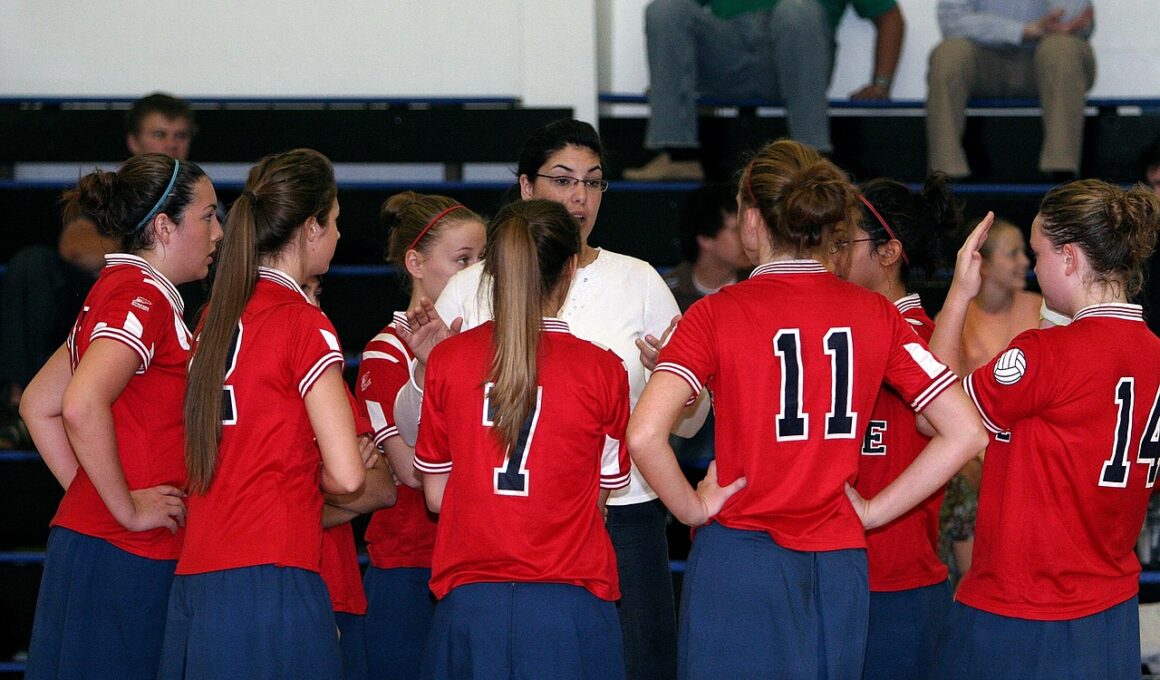Cultural Sensitivity in Volleyball Coaching
Cultural sensitivity is crucial in volleyball coaching, as it fosters an inclusive environment for players from diverse backgrounds. Each player brings unique experiences, beliefs, and customs that enrich the team dynamic. Coaches should prioritize understanding these differences to connect with their athletes better. Start by educating yourself about the various cultures represented within your team. Attend workshops or seminars that focus on diversity in sports. This knowledge will not only help in relating to players but also in tailoring coaching methods to suit their needs. For example, understanding the significance of team rituals from different cultures can enhance team bonding. Additionally, encourage open conversations among players about their cultural traditions. This helps in forming a supportive community where everyone feels valued. Implementing structured discussions on cultural experiences can enhance communication and strengthen team morale. Challenging stereotypes and prejudices is essential; using team meetings to confront biases fosters awareness and empathy. Coaches must model inclusivity and demonstrate respect in every interaction, setting the tone for the entire team. By doing so, the coaching environment becomes a safe space for players to express their authentic selves.
Communication Techniques for Inclusion
Effective communication techniques are vital to promote inclusion in volleyball coaching settings. To achieve this, consider employing a variety of strategies that cater to different learning styles. Visual aids such as diagrams or videos can be particularly helpful. These tools clarify complex plays and serve as universal points of reference for diverse learners. In addition, utilize auditory techniques, including verbal cues and storytelling, to engage players meaningfully. Implement regular feedback sessions where players can voice their thoughts and concerns openly. This approach not only cultivates trust but also promotes a sense of belonging. Be sure to create an open-door policy, allowing team members to express concerns in a confidential setting. Incorporating group discussions encourages collaborative problem-solving, fostering inclusivity. Establish a mentorship program pairing leaders with younger athletes, aiding acclimatization to the team dynamics. Encourage players to share their experiences and insights, which can pave the way for deeper understanding and mutual respect. Highlight the importance of active listening as a coach, ensuring that every voice is heard and acknowledged. Such practices undoubtedly strengthen team bonds and enhance overall performance, creating an inclusive volleyball environment.
Building Team Cohesion through Diversity
Diversity can significantly enhance team cohesion in volleyball by promoting understanding and collaboration among players. An inclusive team environment allows players to appreciate each other’s strengths and contributions. Begin by setting shared goals that unites the team regardless of cultural backgrounds. Establishing common objectives cultivates commitment while building a sense of community. Regular team-building activities provide opportunities to celebrate individual and collective achievements. Incorporating cultural celebrations into team events promotes respect and appreciation for diverse backgrounds. Allow players to share their cultural practices or sportsmanship methods during practice sessions. This exchange enriches team interactions and encourages cooperation. Moreover, team discussions around historical achievements from various cultures in volleyball can inspire players. Highlighting stories of successful athletes representing diverse backgrounds fosters aspiration and a sense of pride. Coaches should continually promote empathy and understanding, reinforcing the importance of teamwork in overcoming challenges. Prioritizing diversity in recruitment helps create an environment where every athlete feels valued. Ultimately, fostering an inclusive atmosphere where everyone contributes leads to improved synergy and team performance, reflecting through victories and enhanced individual skills on the court.
Training Strategies for Diverse Athletes
Implementing effective training strategies for diverse athletes ensures all players achieve their potential. Coaches should develop flexible training regimens that consider individual needs shaped by cultural backgrounds. Recognizing different physical characteristics and athletic abilities is essential. Tailor drills that cater to diverse skill sets for optimal engagement and effectiveness. In designing training sessions, introduce drills focusing on different cultural aspects and techniques from various volleyball styles. Incorporating these elements can motivate players and expose them to new perspectives. Prioritize inclusivity by rotating practice roles, allowing each athlete to experience various positions and responsibilities. This approach highlights the transferable skills of all players while showcasing unique attributes. Foster a supportive atmosphere by encouraging collaboration among teammates. Establish peer coaching periods where players can mentor each other through skill development. This not only enhances learning but also strengthens bonds among athletes. Emphasizing growth mindset principles fosters resilience, cultivating their ability to adapt and persevere. Coaches can challenge athletes individually while acknowledging different cultural influences on their performance to shape positive reinforcement in skills development. The result is a united team that respects the diversity of skills and experiences while striving toward common goals.
Encouraging Positive Relationships
Encouraging positive relationships among volleyball team members is essential for creating an inclusive atmosphere. Healthy team dynamics stem from mutual respect and understanding, fostering a supportive environment. Coaches play a crucial role in guiding players to appreciate each other’s differences and similarities. Establish team norms emphasizing kindness, empathy, and inclusivity. Organize icebreaker activities where players can share their interests and backgrounds, allowing connections to form. These interactions promote camaraderie and help break down barriers. Incorporate team-building exercises that challenge athletes to work collaboratively toward common goals. For example, small-group challenges can encourage communication and teamwork within a culturally diverse framework. Encourage players to recognize and celebrate each other’s achievements, both on and off the court. This recognition creates a culture of appreciation that bolsters self-esteem among all team members. Coaches must model positive behaviors such as active listening and constructive feedback during practices and games. Foster an environment where every athlete feels valued for their contributions, paving the way for lasting friendships. Ultimately, nurturing these positive relationships will enhance team morale and performance, solidifying team unity and success in competitions.
Community Engagement and Support
Engaging with the local community reinforces the sense of inclusion and support in volleyball coaching. Establish partnerships with community-based organizations that promote diversity and empowerment in sports. Collaboration with these groups can help expand outreach efforts and provide additional resources for training sessions. Hosting clinics and workshops that focus on inclusivity in volleyball involves not only current players but also aspiring athletes from all backgrounds. Offering free or low-cost training sessions ensures accessibility for underrepresented youth, helping to break down financial barriers. Creating a welcoming environment at local events encourages families to get involved and support the team, enhancing community spirit. Forming alliances with schools to promote volleyball can significantly increase participation, bridging gaps between cultural communities. Additionally, featuring speakers from diverse backgrounds can inspire young athletes and nurture their dreams. Leveraging social media for community engagement is critical—sharing stories of diverse athletes and their journeys fosters excitement and motivation. Coaches should actively seek ways to involve community members in training or events, promoting cooperation and understanding. Ultimately, these efforts create a culture that values diversity, inspiring the next generation of volleyball players.
Embracing Feedback for Growth
Embracing feedback mechanisms enhances communication and fosters growth in volleyball coaching. Establishing a culture of feedback encourages athletes to share their thoughts openly without fear of reprisal. Setting aside time during practices for feedback sessions can facilitate this. Utilize anonymous surveys to gather insights on team dynamics, training preferences, and overall satisfaction. Coaches can assess players’ perspectives on training quality, support, and inclusivity, leading to informed improvements. Open dialogue sessions can promote transparency and understanding among team members. Implementing 360-degree feedback forms, allowing players to evaluate each other and the coach, empowers athletes to take an active role in their development. Create action plans that address any issues raised, demonstrating commitment to creating a supportive environment. Reinforce the idea that feedback is an ongoing process, underpinning continuous improvement. Coaching staff should show vulnerability by acknowledging their areas for growth and being open to suggestions from players. Recognizing individual contributions to team feedback helps maintain morale and fosters accountability. Creating a team ethos centered on improvement builds a stronger bond among athletes, allowing them to overcome challenges together and grow as a cohesive unit.


